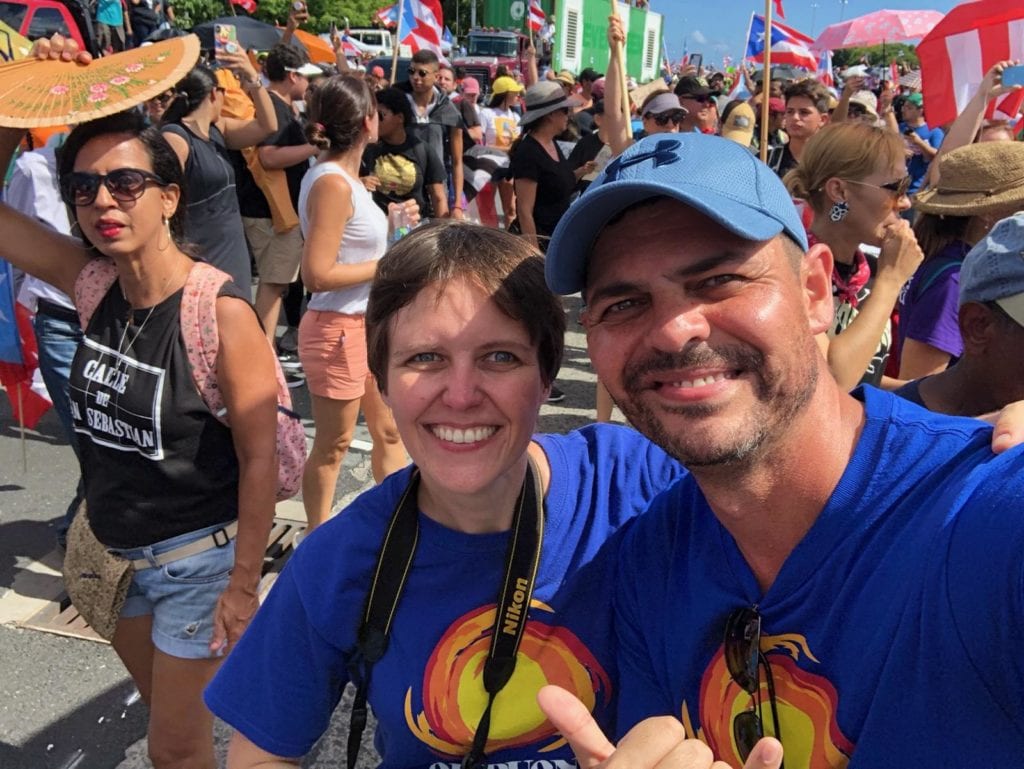
In the months leading up to Puerto Rican Governor Ricardo Rosselló’s resignation, David Ortiz had helped plan and participated in numerous rallies protesting the New Progressive Party’s handling of the disaster relief aid the island received in the wake of Hurricane Maria.
But little prepared him for the human tidal wave that swept down Highway 52 in San Juan July 22.
“The on-ramp to the highway was packed,” he said. “It was shoulder-to-shoulder. I knew right away it was definitely the biggest march in the history of Puerto Rico. We were making history.”
As it turned, the July 22 demonstration was the decisive moment that brought Rosselló down. Although faced with a corruption investigation that saw two of his cabinet members arrested and the leak of more than 800 pages of texts between administration officials that mocked those killed during Hurricane Maria and denigrated women, gays and blacks, Rosselló had tenaciously clung to power, vowing to serve out the last year of his term in office.
But with images broadcast around the world of a highway full of angry voters, including members of his own party, and a mob of angry demonstrators outside La Fortileza — the governor’s residence in San Juan — Rosselló folded. His resignation announcement touched off another round of jubilant demonstrations and calls for his successor, Secretary of Justice Wanda Vazquez, who herself is facing corruption investigations, to step aside.
Ortiz, who grew up in Roxbury and moved to Puerto Rico to head the El Puente Latino Climate Action Network, said resentment toward Rosselló’s government had been growing in the wake of Hurricane Maria and what many regard as a series of botched post-hurricane reconstruction efforts.
Rosselló’s education secretary, Julia Keleher, came under fire for closing schools and opening the island’s first charter school before she was arrested and charged with illegally steering contracts to people connected to her administration. Keleher and other Rosselló administration officials channeled a total of $63 million in contracts to the accounting firm BDO Puerto Rico, headed by a former official in Rosselló’s party, Alberto Velázquez Piñol, who was indicted on corruption charges along with Keleher.
The multi-million-dollar contracts that went to attorneys and consultants with ties to Rosselló’s inner circle grated nerves in Puerto Rico, where the median household income is just $15,000 a year and many homes are still without the roofs they lost during the hurricane.
“Since Maria, people have seen the island deteriorate,” Ortiz told the Banner. “Our island is so fragile right now. To know that people are still willing to steal when the people have so little is really hurtful.”
In addition to Rosselló administration officials, demonstrators directed their ire at the Financial Oversight and Management Board, which has been managing the island’s debt since its members were appointed by the Obama administration in 2016. Many on the island refer to the board as La Junta and fear it will seek to enlarge its powers in the current leadership crisis.
In the runup to the July 22 demonstration, Reggaeton star Residente and singer iLe, both of the group Calle 13, and Reggaeton star Bad Bunny released a song, “Afilando los Cuchillos” (sharpening the knives), a takedown of Rosselló and his administration that became an anthem of the resistance and decried Rosselló’s apparent callous attitude toward the Puerto Rican people.
“Your apologies are drowned with rain water/In houses that still don’t have a roof,” Residente raps.
The Calle 13 members and Bad Bunny, along with singer Ricky Martin, who was targeted in Rosselló’s homophobic chat group messages, all turned out for the protest, spurring the demonstrators on.
“It was really inspiring,” Ortiz said. “Having the artists be a part of it made people feel they had something they could get behind. It created an atmosphere that was festive. It demonstrated that artists have a lot of influence, that art can make a strong impact in our communities.”
More than anything, Ortiz says, it was the disclosure of the Rosselló administration’s chat group messages that got people into the streets. Once there, demonstrators chanted, “Ricky renuncia y llevate la junta” (Ricky, leave and get rid of the fiscal board). In another chant, the demonstrators sang, “Donde esta Ricky? No esta aqui. Ricky esta vendiendo lo que queda del país” (Where is Ricky? Ricky isn’t here. Ricky is selling what remains of our country).
Some protestors in Puerto Rico say they’ll continue to keep pressure on the government until the remnants of Rosselló’s government are gone.
“I think it’s a moment to clean the slate and have a government that really responds to the needs of the people,” Puerto Rican-based political commentator Osvaldo Carlo told Al Jazeera News last week.







